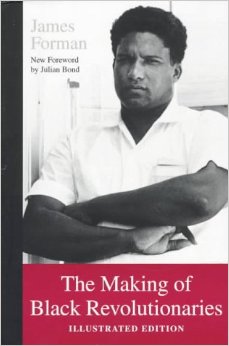 This eloquent and provocative autobiography, originally published in 1972, records a day by day, sometimes hour by hour, compassionate account of the events that took place in the streets, meetings, churches, jails, and in people’s hearts and minds in the 1960s civil rights movement. [Publisher’s description.]
This eloquent and provocative autobiography, originally published in 1972, records a day by day, sometimes hour by hour, compassionate account of the events that took place in the streets, meetings, churches, jails, and in people’s hearts and minds in the 1960s civil rights movement. [Publisher’s description.]
“James Forman’s The Making of Black Revolutionaries is a classic, a personal, no holds barred inside look at the civil rights movement. Written by an insider, it offers an invaluable look at the politics and the personalities that shaped the movement and continue to shape American life.” —Julian Bond
“The Making of Black Revolutionaries was the most ambitious, politically astute, and emotionally engrossing memoir to emerge from the 1960s. Anyone interested in understanding the present state of Black politics should read this outstanding example of engaged historical analysis.” —Clayborne Carson, Stanford University
In this autobiographical chronicle of three decades of black rural and ghetto life and SNCC organizing in the early ’60’s, Forman has achieved an unusual clarity of political exposition and a high degree of self-awareness. Judging from the Black Manifesto demands he helped sponsor against Protestant churches, he could be viewed as an especially imaginative hustler; but this book adds many other dimensions. In the first part, Forman faces degradation, chaos, and desperation with individualistic stamina; in the second part he surveys the civil rights movement from the Montgomery bus boycott through SNCC’s high point in 1964 and finally its collapse and replacement by the Panthers. Forman’s anti-white rhetoric often belies a narrative honesty which details encounters with racist whites with acknowledgment of the whites’ bind between personal compassion and social compulsion. Forman views World War II as a powerful shaper of black impatience; he participates in Air Force desegregation and deplores the treatment of Okinawan women by both whites and blacks. And then SNCC — portrayed as a real flesh-and-blood political organization with factional disputes, leadership deficiencies, and the theoretical anemia disguised by a “”we-all-are-just-here-to-organize”” ideology. Forman’s sharpest barbs are directed at the NAACP-Urban League — CORE-white liberal coalition which tolerated SNCC only so long as it supported the government’s civil rights policy. He describes how in 1963 the NAACP counseled the Ford Foundation to destroy SNCC, how Arthur Schlesinger, Jr. redbaited SNCC’s Lawyer’s Guild collaborators, how Wayne Morse pleaded for LBJ versus the Mississippi Freedom Democrats. After SNCC folded, so did Forman, tripping to Africa, bugging the churches, undigging the Panthers: he offers little movement prognosis, but his narrative is unexpectedly valuable and his self-accounting sometimes approaches the heights of Richard Wright’s style and compassion. —Kirkus Review
ISBN: 9780295976594 | University of Washington Press







Twitter
Google plus
LinkedIn